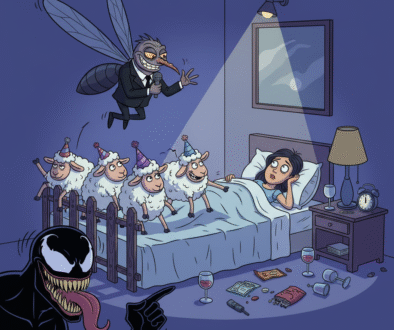
Soft Hearts, Hard Bums: Lessons in Trust, Betrayal, and Resilience
The Savior Who Isn’t
Human collaboration often begins with fireworks. The website expert beams: Call me anytime, I’ll help you. The colleague whispers: We’re in this together. The musician sighs: Finally, someone who understands me.
For a moment, it feels like destiny has delivered the perfect partner. Someone competent, reliable, ready to share the load. But give it a little time and watch the glow fade. The expert becomes allergic to your calls. The musician who promised late-night jam sessions decides they’d rather take up yoga. The colleague’s “team spirit” evaporates the moment deadlines appear.
It’s not collaboration, it’s theatre. Their role was to look like the rescuer in the first act, then vanish when the story required real effort. What they offered wasn’t support — it was ego wrapped in shiny paper.
The Workers Who Are Too Good
On the opposite side are the real workers. The teacher who patiently stays with the child until the letter finally forms. The nurse who quietly notices what everyone else overlooks. The employee who actually does the work while others perfect the art of looking busy.
These people rarely advertise themselves. They don’t rush to be seen in the spotlight, and for that very reason, they are often used. Bosses shower them with superlatives: You are amazing, nobody works like you, you’re the backbone of this place.
Sounds flattering — until you realize the compliment is a leash. It means: Since you’re so good, here’s even more work. Don’t complain, you’re special.
Meanwhile, the loudest ones — always in the right place when the boss walks by — glide through unnoticed. Their skill isn’t in working; it’s in performing. And when they feel threatened by the real workers? They smile sweetly, place a few stones in the road, and prepare the knife for your back.
This is how workplaces quietly exploit the willing: draining the reliable ones while rewarding the performers.
The Burned-Out Teacher Who Refused to Fight
Consider the teacher who poured her heart into her work. She didn’t get involved in office politics, focusing solely on her students. Parents adored her, and some administrators recognized her commitment. Yet her authenticity made her vulnerable.
Enter the micromanaging administrator — terrified anyone might know more than them, threatened by competence, determined to leave nothing to chance. Her words and even body language were twisted against her. Colleagues distanced themselves. Some heads initially admired her, only to later feel insecure, convinced she might overshadow them.
She continued to work, patient and diligent, despite the stones thrown at her path. Eventually, burnout hit. She shut the door on the environment she had given her all to. It was not a failure; it was a natural consequence of giving to those who couldn’t see the value of true competence.
Why We Keep Attracting the Wrong People
Is it bad luck? Are we magnets for unreliable collaborators and manipulative bosses? Or is it, perhaps, something deeper?
Vedic wisdom suggests these are karmic lessons. Rahu lures us with illusions: the perfect partner, the dream collaborator, the supportive boss. Ketu strips them away, forcing detachment and teaching us that nobody else can carry our dream.
Psychology phrases it plainly: those who give 100% too quickly attract those content with 10%. The imbalance is inevitable. Those who promise the most at the start are often the least capable of following through.
Easier Said Than Done
Yes, it’s easier said than done. I’ve been there. I’ve struggled, stumbled, failed, and then tried again. Small successes come, then setbacks. On a personal level, I walk through it because I must. Sometimes the wind hits my face so sharply I want to shout, How long are you going to hurt me? But then the sun comes, and I know it.
At times, what I experience still hurts. I cry. I curse. I roll my eyes so hard I’m practically practicing yoga. And yet, I know these are lessons. Life keeps teaching me, nudging me, even teasing me. Actually, the chaos makes life less boring, more motivating to learn, to move forward, to grow. Stagnation has never been my style. Humor helps. Because honestly, who doesn’t find it absurd that good collaborators vanish, excellent workers are exploited, and competent leaders feel threatened by talent rather than nurtured by it? Life keeps handing you these “characters” — some charming, some poisonous — and insists you figure it out while keeping your wits and dignity.
The Lesson Hidden in Betrayal
The lesson is to collaborate differently. Test people in small ways before handing over the keys to your energy. Value actions above words, consistency above charisma. See enthusiasm as a spark, not proof of commitment. Notice not who beams at the first meeting but who shows up again and again when the excitement fades.
And perhaps the most important lesson: when the wrong people leave, they are not betraying you. They are simply stepping off a stage they were never qualified to stand on. In their exit lies clarity. In their absence, your fire is tested. And from that fire comes resilience — a wisdom forged not from books but from walking the path, falling, and rising again.
Closing Reflection
The myth of the perfect collaborator dies hard. Even when I know the patterns, even when I’ve walked this path before, I still get caught. I still get involved. Not because I enjoy hurting myself — I’m not sadomasochistic — but because life keeps testing my faith in people. I want to trust. I want to believe. It’s complicated. Knowing is one thing; living through it is another.
The storms still hit. But today, I take them in stride. It takes me less time to digest the chaos. I don’t blame myself. I have no regrets. I will try again. And again. As we say in Polish, “Kto ma miękkie serce, musi mieć twardą dupę i liczyć się, że w nią dostanie” (He who has a soft heart must have a hard bum and be ready to get hit in it) — and that’s me. God gave me a big bum for a reason: to cushion every fall, every surprise, every life-and-death curveball. And honestly? I can’t help but laugh through it all.
Collaboration isn’t perfect. People aren’t perfect. Life isn’t perfect. But surviving it, learning from it, and still daring to trust again — that’s the real triumph. And if you can laugh while doing it, all the better.


